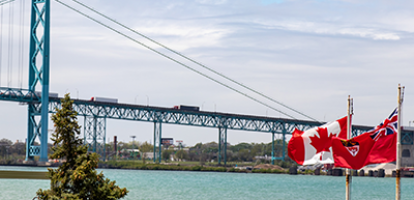From: Lawrence Herman
To: International Standards Observers
Date: July 28, 2023
Re: Private Rule-Making Elbows into Global Governance
Components of the global order, standards in particular, are increasingly generated through private-sector action – outside of governments – and often referred to as “private global rulemaking.”
As I outlined in an earlier Intelligence Memo, these rules and standards can achieve broad international acceptance and, in this way, become important features of a rapidly evolving global trading order. And even though they begin as non-binding and voluntary, governments are beginning to institute them in regulation.
This is an historic change.
One example: The Task Force on Climate-related Financial Disclosure (TCFD) was set up by Financial Stability Board in 2015, chaired by Michael Bloomberg and composed entirely of business representatives from across the globe. Its initial set of recommendations were just issued last February. They are now are being considered for adoption to help implement Ottawa’s April 2022 budget commitment to require reporting of climate-related financial risks by all federally regulated financial institutions as of 2024.
In the field of corporate disclosure, the International Sustainability Standards Board was set up in 2021 by the International Financial Reporting Standards Foundation at COP 26. Last month it issued its initial set of voluntary standards for use across jurisdictions. The federal government is on board, and those standards, refined through the work of the Canadian Sustainability Standards Board, will eventually become mandatory for Canadian publicly traded companies, enforced by regulators such as securities commissions.
There are other private groups developing standards on climate change, decarbonization and related activities. One has only to open the websites of institutions like the G20, UNCTAD, the World Bank, the International Capital Markets Association and others to see the number of active private global rulemaking in these fields.
Apart from financial risk disclosures, a second – and often under-appreciated – area of private global rule setting is the array of commercially enticing product endorsements promulgated by private sector certification bodies, for example, in food safety, environmental protection, animal welfare, fair trade, labour conditions and human rights issues.
Fair Trade International, which supports sustainable development of small producers and agricultural workers in developing countries; the Forest Stewardship Council, certifying “green” forestry products like cardboard and paper for meeting sustainability goals; the Global Organic Textile Standard; and the array of bodies certifying responsible harvesting and “dolphin safe” labels affixed to tuna products. These certifications cover both products and processes, often extending beyond direct manufactured outputs to include upstream sourcing as well.
Their various endorsements are of huge commercial value – check your paper products aisle – and while data are scarce, the impact on transborder business and hence on global trade cannot be discounted.
This leads to other issues. As far back as 2015, the International Centre for Trade and Sustainable Development (ICTSD) warned that,
“ . . . proliferating private standards can result in competition, duplication, and even conflicts among private standards and between private standards and standards developed through the formal standardisation system. Particularly, private standards have the potential to weaken the roles of governments and international standards-setting bodies and may, under certain conditions, even render their work irrelevant. This causes inefficiency in achieving public policy objectives; it can create confusion for producers and consumers, and raises questions about the legitimacy of the market-driven private initiatives.”
The policy issue for governments is how to guide the public through this multiplicity of product certifying bodies. They can have different interests and sometimes competing claims to sectoral authority, leading to business and consumer confusion about relative credibility around issues like decarbonization, human rights and other standards. Beyond greater coherence, consistency and convergence among the hundreds of differing standards, some are calling for action to ensure conformity with a nation’s public policy objectives and regulations.
How should governments respond, individually and collectively?
At the international level, one response would be organizing and possibly ranking the most authoritative of these certifications covering products sold across international borders. Some of this is happening already. There are discussions at the WTO, for example, on coordinating private certifications in the sanitary and phytosanitary and technical barriers to trade fields. But informal arrangements resulting from consultations among like-minded governments may be easier and faster than a formal process.
Meanwhile, governments should monitor the private certifications for consistency with national and international objectives as well as the transparency, openness, and governance of the certifying bodies themselves.
This should lead to public awareness efforts, and there may also be cases where governments can – and should – incorporate privately developed standards into mandatory product certifications.
Whatever course is followed, because of the importance of this aspect of private global rulemaking in international commerce, it behooves governments to follow developments to as to be in a position to take appropriate action where the public interest warrants.
Lawrence Herman is an international lawyer, counsel at Herman & Associates and senior fellow of the C.D. Howe Institute in Toronto.
To send a comment or leave feedback, click here.
The views expressed here are those of the author. The C.D. Howe Institute does not take corporate positions on policy matters.





